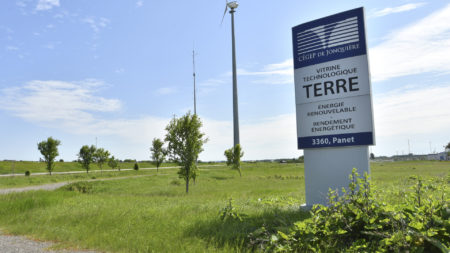The Centre TERRE: A Key Research Platform for Rio Tinto

Saguenay,Jonquiere
CEGEP, annonce construction du Centre terre
Photo / Michel Tremblay
Construction of the building that will house the Centre TERRE at the Cégep de Jonquière was announced last June. Rio Tinto helped fund the construction, but this project, totalling nearly $17 million, is not just about dollars and cents. It will help establish a valuable link between research and industry when it comes to renewable energy.
The Centre TERRE, with its specialised research and training spaces and equipment, will be vital for businesses, organisations, and members of the general public who wish to develop greener and more efficient products. Many players will be able to receive training in various innovative technologies at the Centre.
When asked about the meaning of Rio Tinto’s involvement in the Centre TERRE project, Emmanuel Bergeron, Director,
Regional Economic Development at Rio Tinto, spoke of the company’s commitment to providing hands-on support.
In a telephone interview, Bergeron said: “This project is perfectly in line with Rio Tinto’s sustainable development mission and ambitions—so it was only natural for us to get involved from the very beginning. Yes, we have provided financial support of $300,000 over three years, but we will also participate in an advisory committee to offer our expertise to the researchers.”
Raynald Thibeault, Director General, Cégep de Jonquière, also spoke about the value of this collaboration for the Centre TERRE.
“Rio Tinto’s team members bring their expertise to our strategic discussions and make it possible for us to go further,” said Thibeault. “It’s a great way to bridge the gap between research and industrial realities.”
An experimental laboratory
As part of the mission of the Cégep de Jonquière’s Centre de production automatisée, the Centre TERRE is a new leading-edge facility that will be open to anyone who wishes to benefit from it.
Thibeault noted, “This research and teaching laboratory dedicated to renewable energy will be useful not only to students, professors, and researchers, but also to businesses throughout Quebec, such as Rio Tinto, which will be able to use it to train their employees in this field.”
Implementation of the project will ramp up in the fall of 2022. The building that houses the Centre TERRE should be fully operational by early 2026.


